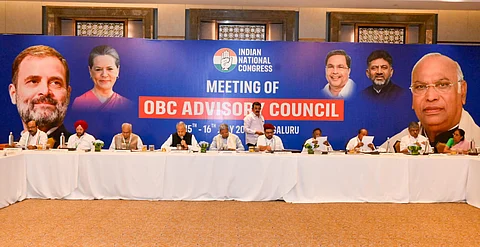

The Congress will campaign country-wide for a national caste census along the lines of the social and economic survey of Telangana and also push for reservations in the private sector.
These were among the resolutions passed during the first meeting of the 24-member Advisory Council of the Congress’ OBC Department held in Bengaluru on Wednesday, July 16. Members from Karnataka include Chief Minister Siddaramaiah, former MP BK Hariprasad, and former CM M Veerappa Moily.
Addressing the media after the two-day meeting concluded on July 16, Chief Minister Siddaramaiah said that the party would make a national push for three demands to meet social justice goals.
These included a “national level caste census” to be carried out by the Office of the Registrar General and Census Commissioner of India (ORGI) along the lines of Telangana’s Socio-Economic, Education, Employment, Political and Caste Survey (SEEEPC).
“The census must include the social, economic, educational, employment, and political aspects of each individual and castes,” Siddaramaiah said.
He also said that the party would campaign for the removal of the 50% cap on reservations placed by the Indra Sawhney judgement, “thereby ensuring suitable reservation for the OBCs in education, service, political and other areas”.
Lastly, he said that the party would also push for reservations in the private sector under Article 15(5) of the Constitution.
Vachanakaras, Wodeyars and BR Ambedkar
Addressing the council on the previous day, Siddaramaiah invoked Basavanna and BR Ambedkar’s call to “educate, agitate and organise”. He also mentioned the affirmative action policy started in India for the first time by Nalwadi Krishnaraja Wodeyar, the early 19th century ruler of the erstwhile Mysuru kingdom, and former CM D Devaraj Urs, considered the post-independence icon of the backward classes.
“I bring warm greetings from the land of Basavanna, Nalwadi Krishnaraja Wadiyar and Devaraj Urs, where social justice is not a slogan, but a lived political consciousness,” Siddaramaiah said.
“We have perpetuated a system that pretends to reward merit, while ignoring the centuries of privilege that shaped the so-called merit… How can we speak of a level playing field in a society where the game was rigged at birth? We must build an India where a weaver’s daughter, a fisherman's son or a laundry worker’s child, can dream freely and not be punished for their birth. We must build an India where work is not measured by caste, and where the burden of history no longer weighs down the future,” he added.
Siddaramaiah also said that the Ahinda model evolved by Karnataka was “truly path-breaking” and was not just “relevant, but also essential”. Ahinda is an acronym for minorities, backward classes and Dalits.
Siddaramaiah said vachanakaras such as Basavanna, Allama Prabhu, Madivala Machideva and Akka Mahadevi had declared that “work is worship”, and that “no caste is superior to the other.”
He quoted a verse attributed to Basavanna which translates to ‘Don’t ask who this man is. Instead, think he is one of ours’
Congress and reservations
Siddaramaiah spoke at length about the Congress’ claims to social justice. He said that it was the Congress government led by former prime minister PV Narasimha Rao which gave the Mandal Commission report “its full life” by implementing 27% reservation for OBCs in government services in 1993.
However, it was VP Singh who headed the Janata Dal government who made the decision to implement the Mandal Commission report.
The Congress government also passed the Backward Classes Commission Act (1993), establishing the National Commission for Backward Classes, Siddaramaiah further said.
Siddaramaiah also said that former PM Rajiv Gandhi initiated social justice for backward classes through the 73rd and 74th Constitutional Amendments, promoting representation at local governance levels.
The UPA-I government, led by Dr Manmohan Singh, advanced this by enacting the 93rd Amendment, ensuring 27% OBC reservation in higher education, Siddaramaiah added.
Closer to home, he mentioned the steps taken by his own government for the advancement of the backward classes.
In 2015, the government launched the Kantharaj Commission to conduct a large-scale Socio, Economic and Educational Survey, covering 1.3 crore households—seen as a step toward justice and representation.
“This was not just an exercise in enumeration but was a moral commitment to visibility, representation, and justice for every community. But the BJP went against social justice by withholding the report from 2019 to 2023,” Siddaramaiah said.
He added that his government had ordered a fresh survey “to ensure updated and fair data reflecting demographic shifts”.
He also said that the Congress was guided by Rahul Gandhi’s slogan “jitni aabadi, utna haq” which referred to proportionate claims over resources.